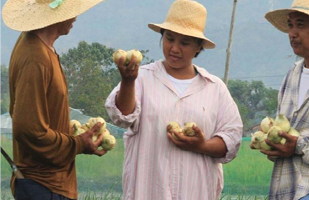
Farmer Entrepreneurship Program: Bridging Farmers to the Corporate Supply Chain
San Jose City, Nueva Ecija
2012
Linking small farmers directly to major buyers of agricultural produce helps ensure better prices and earnings for the former. In 2008, the Local Government Unit of San Jose City ventured into a tie-up with Jollibee Foundation (JF) for a pilot project that would help the onion farmers of San Jose.
The Project was dubbed as “Farmers’ Entrepreneurship Program: Bridging Farmers to the Corporate Supply Chain.” It aimed to link small onion farmers to Jollibee’s supply chain so that they can have a more stable market and obtain a good price for their produce. The small farmers were trained on simple farming technologies that would increase productivity and efficiency. They also entered into partnership with microfinance institutions to develop appropriate models of agricultural loans such as production financing and trade financing. Government Agencies (DA, PhilMech, PhilRice) and NGOs were tapped for various technical and material needs.
To comply with quality and volume requirements of Jollibee Foods Corporation (JFC), they attended workshops and field exposures on modern, organic and sustainable farming systems.
Initially, 15 onion farmers from each barangay were organized into two clusters and later formed the Kalasag Farmers Producers Cooperative (KFPC). The LGU provided logistic support such as transportation, venues and meals for conferences, meetings and other activities. The Catholic Relief Services took care of the capability-building component, while the National Livelihood Development Council facilitated access to low-interest loans through its conduit Alalay sa Kaunlaran, Inc. JF linked the farmers to JFC to be onion suppliers. Intensive training on production, product handling, price negotiation, organizational management (accounting, bookkeeping) and leadership transformed the farmers into entrepreneurs.
KFPC’s first successful delivery to JFC was in March 2009. San Jose’s farmers impressed JFC with only 0.17% reject rate out of the initial volume of 60 metric tons of white onion. In 2010, deliveries to Jollibee totalled 235 MT. In 2011, this further increased to 245 MT, enabling them to earn a gross income of PhP7.3 million. At present, they are also supplying to other consolidators like CDO and private traders.
Previously, the small onion farmers suffered from a negative net income of PhP2,070.13 per harvest season. Under the project, the farmers were able to increase their farm income by around 18% with 45% of this amount gained from the higher buying price offered by JFC compared to local buyers. This enabled some KALASAG farmers to renovate their houses and redeem pawned farmlands. About 180 previously unemployed women and men also earned income from peeling white onions that were delivered to JFC. On the average, each peeler earned PhP288/day during the harvest season from April to June.
Successful deliveries and increased income enabled KFPC to increase its assets. The cooperative was able to buy farm machineries and equipment through grants and loans. These assets include a PhP2Mworth refrigerated truck (with tractor head), a seedling screen house, a cold storage van, a reefer truck and plastic crates.
The newly transformed farmer entrepreneurs became skilled in negotiating with corporations like JFC and are now able to enter into formal contracts with other institutional markets by themselves. KFPC was empowered when they grouped themselves into agro-enterprise clusters and eventually into a cooperative for the purpose of consolidating supply and pooling transport logistics. The farmers are now actively participating in collective production-led activities.
The success of the KFPC farmers of San Jose has inspired other farmers. Since 2009, KFPC was visited by farmers from Pangasinan, Ilocos Sur, Mindanao, Tarlac Province and other agencies. KFPC’s Manager was recognized as “Magsasaka Siyentista” for his scientific expertise on white onion and KFPC was awarded as Most Promising Cooperative in the City. KFPC’s success has made San Jose City “a place where high quality onions are produced.”


